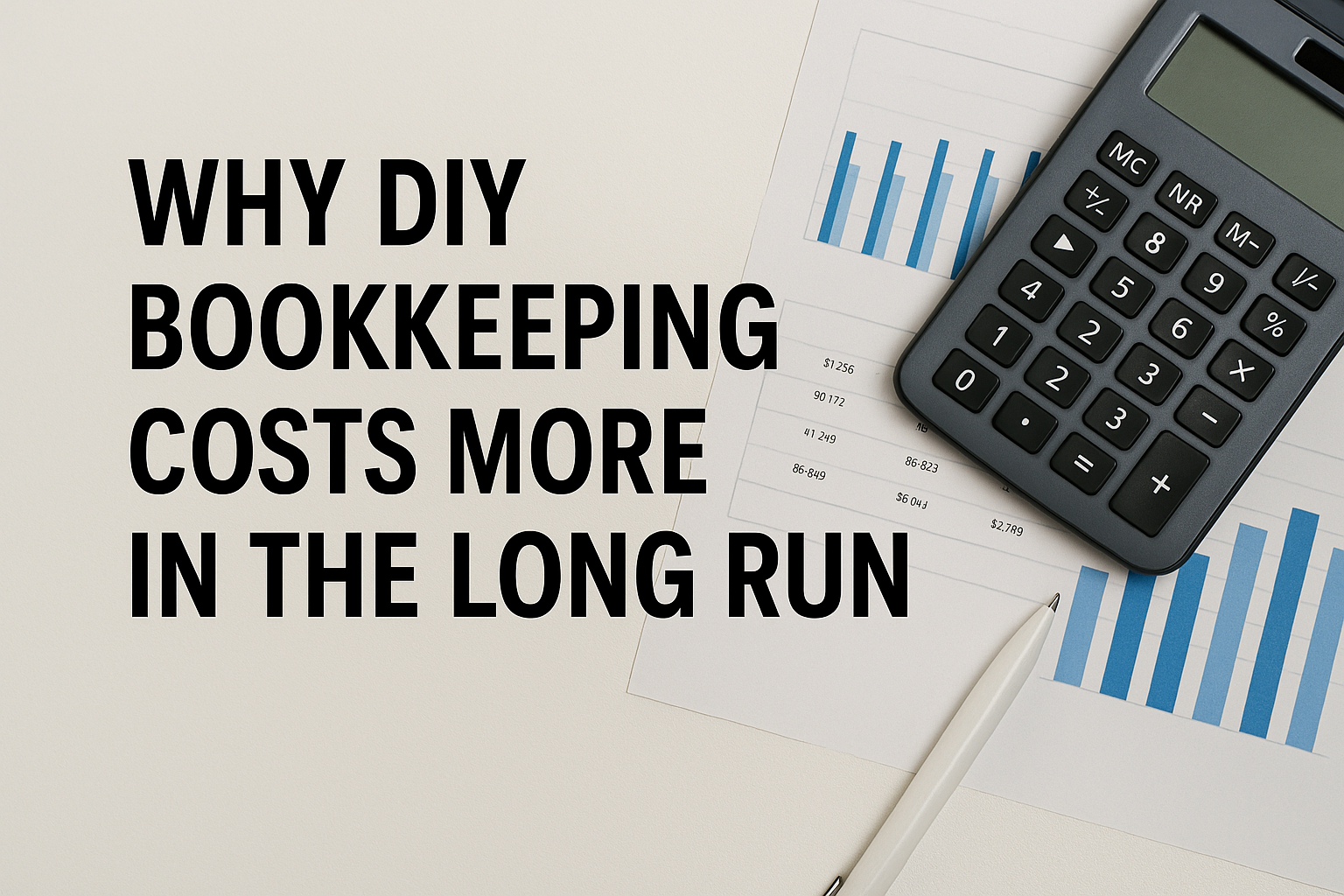DIY bookkeeping costs more than it seems at first glance. The aroma of freshly brewed coffee filled the small café as Amelia flipped open her laptop. The café was her sanctuary—a place where she could think, plan, and work on the dream she had nurtured for years: her online boutique. Like many small business owners, Amelia believed she could handle everything on her own. Marketing, inventory, customer service, and yes, even bookkeeping. After all, how hard could accounting really be?
As Amelia would soon learn, the answer was: deceptively hard.
The Allure of DIY Bookkeeping
When Amelia started her boutique, every penny counted. Hiring a professional accountant or bookkeeper felt like an unnecessary luxury, something she could easily skip to save money. She downloaded a free accounting software and began tracking her expenses and sales. She diligently entered every sale, categorized expenses, and even tried to reconcile her bank statements.
At first, it seemed manageable. But as her boutique grew, so did the complexity of her finances. Returns, discounts, sales tax, and supplier payments all piled up. Amelia found herself spending hours every week trying to make sense of it all, often staying up late into the night. She convinced herself that this was the price of running her own business.
But the cracks began to show.
The Hidden Costs of DIY Mistakes
Amelia’s first major mistake came during tax season. She had unknowingly missed recording several business expenses, which meant she overpaid her taxes. The realization hit her hard when she casually mentioned her frustration to a friend, who worked as an accountant. “You could have saved hundreds,” her friend remarked after a quick look at Amelia’s records.
Then came the penalties. Amelia had underestimated her sales tax payments for two consecutive months, a mistake that invited fines and interest from the tax authorities. The fines weren’t astronomical, but they added unnecessary stress and financial strain.
She wasn’t alone. Studies show that over 40% of small businesses face penalties and fines due to accounting errors. What Amelia didn’t realize was that these mistakes were not just costly in terms of money. They were eroding her peace of mind and eating into the time she could have spent growing her business.
Check out this article on Accounting and Bookkeeping Services: Why They’re the Key to Your Business Success
Understanding the Complexity of Accounting
To the untrained eye, accounting might seem like a simple process of tracking income and expenses. But it’s much more nuanced. There are principles, regulations, and best practices that professionals spend years mastering. Here are just a few areas where DIY bookkeeping often falls short:
1. Tax Laws and Compliance
Tax laws are intricate and ever-changing. For instance, the rules governing deductible expenses vary depending on the type of business and location. Without proper knowledge, business owners can miss out on significant tax savings—or worse, trigger audits due to incorrect filings.
2. Cash Flow Management
Tracking revenue is one thing; understanding cash flow is another. Many DIY bookkeepers fail to differentiate between profits and cash on hand. This can lead to liquidity issues, making it difficult to pay bills or invest in growth.
3. Reconciling Accounts
Reconciling accounts—matching bank transactions with bookkeeping records—is a meticulous task. Amelia often rushed through it, missing discrepancies that could have highlighted issues like double charges or fraud.
4. Long-Term Financial Planning
DIY bookkeeping is often focused on the present. Professional accountants, however, look at the big picture. They provide insights that can guide strategic decisions, such as when to expand, how to reduce costs, or whether a loan is financially prudent.
The Ripple Effects of Mistakes
Amelia’s bookkeeping mistakes didn’t just cost her money. They also hindered her business growth in unexpected ways.
- Missed Opportunities: Amelia had wanted to apply for a small business loan to stock up on inventory ahead of the holiday season. But her disorganized financial records made the application process cumbersome, delaying the loan approval.
- Damaged Reputation: When Amelia forgot to pay a supplier on time due to poor record-keeping, it strained their relationship. Small businesses often rely on strong partnerships, and such mistakes can tarnish trust.
- Mental Strain: The constant worry over her finances began to take a toll on Amelia’s mental health. She felt trapped, unable to focus on the creative aspects of her business that she loved.
The Turning Point: Seeking Professional Help
Amelia’s breaking point came when she received an audit notice. Panic set in as she realized her DIY bookkeeping might not hold up under scrutiny. Desperate, she reached out to a professional accountant.
It was a humbling moment, but also a transformative one. The accountant not only helped Amelia navigate the audit but also overhauled her entire bookkeeping system. They identified missed deductions, streamlined her tax payments, and set up automated processes to reduce manual errors.
The cost of hiring an accountant? About $2,500 a year. The savings and peace of mind? Priceless.
Why Professional Bookkeeping Pays Off
Amelia’s story is not unique. Many small business owners underestimate the value of professional bookkeeping, only to learn the hard way. Here’s why hiring a professional is worth the investment:
1. Error Reduction
Professionals are trained to catch and prevent errors, ensuring your financial records are accurate and compliant.
2. Time Savings
By outsourcing bookkeeping, you can reclaim hours of your time to focus on core business activities.
3. Strategic Insights
Accountants don’t just record numbers; they interpret them, providing valuable insights that can drive your business forward.
4. Stress Reduction
Knowing your finances are in expert hands gives you peace of mind, allowing you to focus on what you do best.
Lessons Learned: Amelia’s Advice to Other Business Owners
Today, Amelia’s boutique is thriving. Her financial records are organized, her taxes are paid on time, and she no longer dreads the arrival of audit notices. Reflecting on her journey, she shares these tips with fellow entrepreneurs:
- Don’t Wait Until It’s Too Late: Hire a professional as early as possible. The longer you wait, the harder it becomes to untangle mistakes.
- Invest in Training: Even if you hire an accountant, basic financial literacy is essential for every business owner.
- Embrace Technology: Modern accounting software, when used correctly, can simplify processes and reduce errors.
- Focus on Your Strengths: Remember why you started your business. Delegate tasks that distract you from your core mission.
Conclusion
Amelia’s story is a cautionary tale for any entrepreneur tempted by the lure of DIY bookkeeping. While it might seem like a cost-saving measure initially, the hidden costs—both financial and emotional—can far outweigh the savings.
Professional bookkeeping isn’t just an expense; it’s an investment in your business’s success. By trusting experts to handle the numbers, you can focus on what truly matters: building your dream and watching it flourish.
So the next time you find yourself juggling spreadsheets late into the night, remember Amelia’s journey. Getting the help of experts is the smartest decision you can make.
For further reading: Understanding Accounting Errors, How to Detect and Prevent Them







2 responses to “Accounting Mistakes: Why DIY Bookkeeping Costs More in the Long Run”
A cautionary tale for small business owners! DIY bookkeeping might seem cost-effective at first, but the potential mistakes and missed savings can add up quickly. A valuable reminder to invest in professional help when it comes to managing finances.
A thought-provoking article! The story of Amelia’s DIY bookkeeping struggles serves as a valuable reminder of the importance of professional accounting services. Investing in expert help can save small business owners from costly mistakes, reduce stress, and ultimately drive growth. A must-read for entrepreneurs looking to manage their finances wisely!